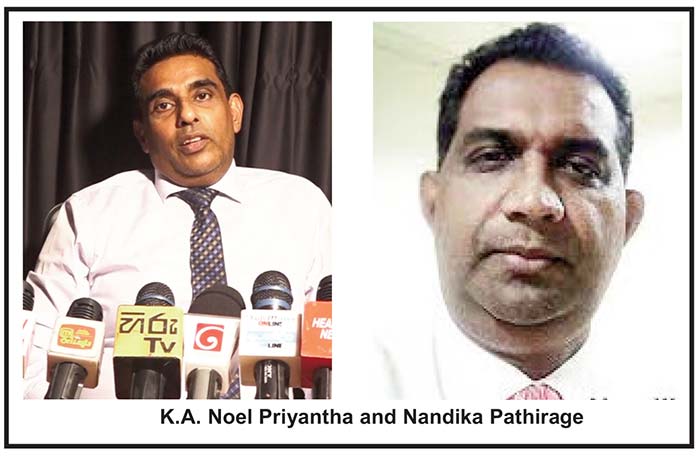News
CEB trying to recover loss of Rs 32 bn during drought by increasing electricity tariffs

By Rathindra Kuruwita
The Ceylon Electricity Board (CEB) wants to recover about 32 billion that the institution lost through the year, within the next three months, with a tariff hike, K.A. Noel Priyantha, Deputy General Manager (Business & Operational Strategy) said in a televised interview.
“On 15 February, 2023, we got a tariff increase. So for 45 days in 2023, we only got the 2022 tariffs. In June 2023, we proposed a three percent reduction of the tariff, but the Public Utilities Commission of Sri Lanka (PUCSL) recommended a 14 percent cut. We lost about 32 billion rupees in expected revenue because of these two reasons,” he said.
Priyantha said that the CEB had issues with PUCSL in the recent past and that it is only now that the relationship between the two institutions has improved.
“We expected rains, but there was a dry patch, and we had to release water from Samanalawewa for agriculture. We could produce less electricity from hydropower than we expected. We now need to produce electricity using fossil fuels. That costs more, and we can’t borrow now, so we need to go for a tariff increase. The IMF has insisted on cost-reflective pricing. We are trying to recover the 32 billion we have lost with the tariff hike,” he said.
The DGM said that the CEB only has three months to achieve its revenue targets. If PUCSL had only approved a three percent tariff reduction, there would have been no need to increase tariffs by a significant percentage.
“The CEB spends 2.80 rupees to produce a unit of electricity, using hydropower. The CEB is allowed to revise tariffs once every six months, but diesel prices are revised once a month. The average cost of a unit of electricity now is about 44 rupees,” he said.
Priyantha said they have forwarded two proposals to the CEB. One suggestion is to increase the tariff for a unit of electricity by eight rupees for all consumers. The other is a 22 percent tariff hike across the board, he said.
A few years ago, the CEB could have purchased a unit of electricity, generated by renewable sources, for around 22 rupees, he said. Unfortunately, some elements at the CEB were against local businessmen making money, and the solar power industry is now on the verge of collapse, Priyantha said.
“Moreover, we have not paid renewable energy producers in eight months. I always bring this issue up and some progress has been made. We are making some big investments. In Mannar, a 500 megawatt wind plant is coming up,” he said.
The CEB is also making space for a 200 megawatt solar power park. One of the main problems with renewable energy is the need to establish extremely costly transmission lines, he said.
“It doesn’t make sense to have a 10-megawatt renewable energy project. At least 100 megawatts need to be produced to make the cost of the transmission line profitable,” he said.
All solar farms connect to a specific point on the electrical grid, and that point is called the “point of interconnection,” or POI. The POI is different for utility-scale versus community solar scale projects, he said.
A community solar project is smaller than a utility-scale project. The project size is measured in terms of capacity. Community solar projects are typically 10 MW or smaller. These projects almost always connect to a three-phased distribution line. A distribution line is conceptually the same as a transmission line but moves electricity at a much lower voltage. A distribution line must be within about 1.6 kilometers of your property (or preferably much less) to make interconnection cost-effective.
Utility-scale projects connect by either connecting directly to a substation or tapping a transmission line (69 kV or higher).
Unless the solar farm is right next to a transmission line or substation, a dedicated transmission line called a generation tie (“gen-tie”) will need to be built. These gen-ties cost approximately one million dollars per 1.6 kilometers to construct, he said.
CEB Senior Engineers’ Association (CEBSEA) Spokesperson Engineer Nandika Pathirage said that reservoirs are receiving rain. On average, the water levels are at about 43 percent, and about 25 giga watt hours of electricity can be produced, he said.
“We only use about 11 gigawatt-hours of electricity. Now we only produce 40 percent of our electricity needs using fossil fuels,” he said.
Pathirage, however, denied claims that the PUCSL has recommended a 14 percent tariff reduction when the CEB has demanded only three.
“PUCSL decided based on the CEB data. When we asked PUCSL, they said that they, in fact, only gave what the CEB asked for. However, it is obvious that there is a cash flow issue now, and the CEB has now asked for a 22 percent tariff hike,” he said.
Pathirage said that the CEB management is of the view that they will not revise tariffs once the PUCSL approves the 22 percent tariff hike.
“We have received less rain fall than expected. The lowest probably since 2018. However, we expect that in the coming months, the north-eastern monsoon will fill up the reservoirs,” he said.
News
US sports envoys to Lanka to champion youth development

The U.S. Embassy in Colombo welcomed the U.S. Sports Envoys to Sri Lanka, former National Basketball Association (NBA) and Women’s National Basketball Association (WNBA) players Stephen Howard and Astou Ndiaye, from June 8 through 14.
The Public Diplomacy section of the U.S. Embassy said that it would launch a weeklong basketball program intended to harness the unifying power of sports, made possible through collaboration with Foundation of Goodness and IImpact Hoop Lab.
While in Sri Lanka, Howard and Ndiaye, both retired professional basketball players, will conduct a weeklong program, Hoops for Hope: Bridging Borders through Basketball. The Sports Envoys will lead basketball clinics and exhibition matches and engage in leadership sessions in Colombo and Southern Province for youth aged 14-18 from Northern, Uva, Eastern and Western Provinces, offering skills and leadership training both on and off the court. The U.S. Envoys will also share their expertise with the Sri Lanka Basketball Federation, national coaches, and players, furthering the development of basketball in the country. Beyond the clinics, they will collaborate with Sri Lankan schoolchildren to take part in a community service project in the Colombo area.
“We are so proud to welcome Stephen and Astou as our Sports Envoys to Sri Lanka, to build on the strong people-to-people connections between the United States and Sri Lanka,” said U.S. Ambassador Julie Chung. “The lessons that will be shared by our Sports Envoys – communication, teamwork, resilience, inclusion, and conflict resolution – are essential for leadership development, community building, equality, and peace. The U.S. Sports Envoy program is a testament to our belief that sports can be a powerful tool in promoting peace and unity.”
News
Rahuman questions sudden cancellation of leave of CEB employees

SJB Colombo District MP Mujibur Rahuman in parliament demanded to know from the government the reasons for CEB suspending the leave of all its employees until further notice from Thursday.
MP Rahuman said that the CEB has got an acting General Manager anew and the latter yesterday morning issued a circular suspending leave of all CEB employees with immediate effect until further notice.
“We demand that Minister Kanchana Wijesekera should explain this to the House. This circular was issued while this debate on the new Electricity Amendment Bill was pending. There are many who oppose this Bill. The Minister must tell parliament the reason for the urge to cancel the leave of CEB employees,” the MP said.However, Speaker Mahinda Yapa Abeywardena prevented Minister Wijesekera responding to the query and said that the matter raised by MP Rahuman was not relevant.
News
CIPM successfully concludes 8th Annual Symposium

The Chartered Institute of Personnel Management (CIPM) successfully concluded the 8th Annual CIPM Symposium, which took place on 31st May 2024. Themed “Nurturing the Human Element—Redefining HRM in a Rapidly Changing World,” the symposium underscored the pivotal role of human resource management (HRM) in today’s dynamic global landscape. Since its inception in 1959, CIPM has been dedicated to advancing the HR profession through education, professional development, and advocacy, solidifying its position as Sri Lanka’s leading professional body for HRM.
Ken Vijayakumar, the President of the CIPM, graced the occasion as the chief guest. The symposium commenced with the welcome address by the Chairperson, Prof. Arosha Adikaram, followed by the Web Launch of the Symposium Proceedings and Abstract Book by the CIPM President. The event featured distinguished addresses, including a speech by Chief Guest Ken Vijayakumar, President of CIPM, and an address by Guest of Honor Shakthi Ranatunga, Chief Operating Officer of MAS Holdings Pvt. Ltd., Sri Lanka.
The symposium also featured an inspiring keynote address by Prof. Mario Fernando, Professor of Management and Director of the Centre for Cross Cultural Management (CCCM) at the University of Wollongong, Australia.
Vote of Thanks of the inauguration session was delivered by Dr. Dillanjani Weeratunga, Symposium Co-chair.
The symposium served as a comprehensive platform for researchers to present their findings across a wide range of critical topics in HRM. These included Cultural Diversity and Inclusion, Talent Development and Retention, Ethical Leadership and Corporate Social Responsibility, Adapting to Technological Advancements, Mental Health and Well-being at Work, Global Workforce Challenges, Employee Empowerment, and Reskilling and Upskilling.
The plenary session was led by Prof. Wasantha Rajapakse. Certificates were awarded to the best paper presenters during the valedictory session, followed by a vote of thanks delivered by Kamani Perera, Manager of Research and Development.
The annual symposium of CIPM was a truly inclusive event, attracting a diverse audience that spanned undergraduates, graduates, working professionals, research scholars and lecturers. This widespread interest highlights the symposium’s significance in the field of HRM, offering a unique opportunity for everyone to network and learn from scholarly brains.The CIPM International Research Symposium was sponsored by Hambantota International Port, Sri Lanka Institute of Information Technology (SLIIT), E B Creasy & Co. PLC, and Print Xcel Company.




















